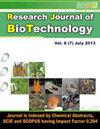Identification of novel PPAR-γ agonist ameliorating triple negative breast cancer by in silico methods
IF 0.2
Q4 BIOTECHNOLOGY & APPLIED MICROBIOLOGY
引用次数: 0
Abstract
Triple negative breast cancer (TNBC) is still considered a medical challenge as it is an aggressive cancer characterized by poor prognosis, frequent metastasis, distinct clinical and pathological features and lack of proper treatment options. In TNBC, estrogen, progesterone and Her2 neu receptors are absent, which are usually present in otherwise breast cancers. So, hormonal therapy cannot be given in case of TNBC, leaving chemotherapy as the mainstay for treatment. However, chemotherapy is an infamous therapeutic option due to several aweful side effects like loss of appetite, extreme weight loss, hair loss, vomiting, fatigue etc. Several reports have highlighted role of Peroxisome Proliferated Activated Receptor gamma (PPAR-γ) in ameliorating breast cancer, but it is still less explored receptor for TNBC. Moreover, synthetic PPAR gamma agonists like thiazolidinediones, have good capability of activating PPAR-γ receptor, but these are also gloomy therapeutic agent due to their dreadful side effects like hepatotoxicity, bladder cancer, congestive heart failure etc. So, there is serious urge among researchers to find safer therapeutic option for TNBC. Phytochemicals are nowadays grabbing attention worldwide to treat several diseases due to their fewer or no side effects. This in silico study was performed after thorough review to select a natural, potent PPAR-γ agonist Gallotanin, as a query compound for ligand based similarity searching in PubChem database with 80% filter. Top 10 obtained compounds having highest similarity index were chosen for molecular docking in AutoDock Vina, with PPAR-γ receptor (3V9T) to know their binding patterns. Further, top 5 compounds having highest dock scores underwent ADME studies in SwissADME to assess pharmacokinetic profile of these compounds. Finally, this in silico study resulted in discovery of compound called Chamuvaritin which is still not known as a PPAR-γ agonist, efficient enough to act as potent therapeutic agent against TNBC.通过硅学方法鉴定可改善三阴性乳腺癌的新型 PPAR-γ 激动剂
三阴性乳腺癌(TNBC)是一种侵袭性癌症,具有预后差、转移频繁、临床和病理特征明显以及缺乏适当治疗方案等特点,因此仍被视为医学难题。在 TNBC 中,雌激素、孕激素和 Her2 neu 受体缺失,而这些受体通常存在于其他乳腺癌中。因此,TNBC 无法进行激素治疗,只能以化疗为主。然而,由于食欲不振、极度消瘦、脱发、呕吐、疲劳等几种可怕的副作用,化疗是一种臭名昭著的治疗选择。有几篇报道强调了过氧化物酶体增殖激活受体γ(PPAR-γ)在改善乳腺癌中的作用,但对于 TNBC 来说,这种受体的作用还较少被研究。此外,噻唑烷二酮类等合成 PPAR γ 激动剂具有激活 PPAR-γ 受体的良好能力,但由于其可怕的副作用(如肝毒性、膀胱癌、充血性心力衰竭等),这些药物也是令人沮丧的治疗药物。因此,研究人员迫切希望为 TNBC 找到更安全的治疗方案。如今,植物化学物质因其副作用小或无副作用而在治疗多种疾病方面备受全球关注。本硅学研究经过全面审查,选择了一种天然、强效的 PPAR-γ 激动剂 Gallotanin 作为查询化合物,在 PubChem 数据库中进行基于配体的相似性搜索,过滤率为 80%。在 AutoDock Vina 中选择了相似性指数最高的前 10 个化合物与 PPAR-γ 受体(3V9T)进行分子对接,以了解它们的结合模式。此外,对接得分最高的前 5 个化合物还在 SwissADME 中进行了 ADME 研究,以评估这些化合物的药代动力学特征。最后,这项硅学研究发现了一种名为 Chamuvaritin 的化合物,它是一种 PPAR-γ 激动剂,但目前还不为人所知,它足以成为 TNBC 的强效治疗剂。
本文章由计算机程序翻译,如有差异,请以英文原文为准。
求助全文
约1分钟内获得全文
求助全文
来源期刊

Research Journal of Biotechnology
BIOTECHNOLOGY & APPLIED MICROBIOLOGY-
CiteScore
0.60
自引率
0.00%
发文量
192
期刊介绍:
We invite you to contribute Research Papers / Short Communications / Review Papers:
-In any field of Biotechnology, Biochemistry, Microbiology and Industrial Microbiology, Soil Technology, Agriculture Biotechnology.
-in any field related to Food Biotechnology, Nutrition Biotechnology, Genetic Engineering and Commercial Biotechnology.
-in any field of Biotechnology related to Drugs and Pharmaceutical products for human beings, animals and plants.
-in any field related to Environmental Biotechnolgy, Waste Treatment of Liquids, Soilds and Gases; Sustainability.
-in inter-realted field of Chemical Sciences, Biological Sciences, Environmental Sciences and Life Sciences.
-in any field related to Biotechnological Engineering, Industrial Biotechnology and Instrumentation.
-in any field related to Nano-technology.
-in any field related to Plant Biotechnology.
 求助内容:
求助内容: 应助结果提醒方式:
应助结果提醒方式:


